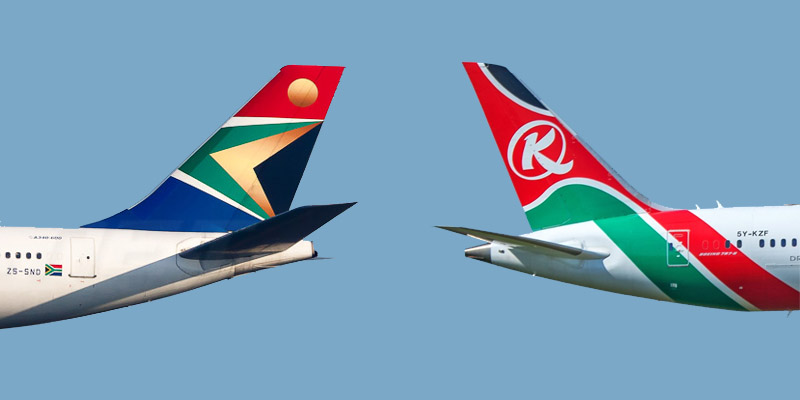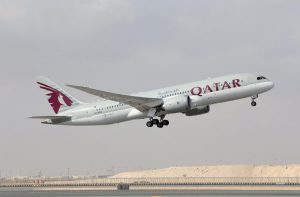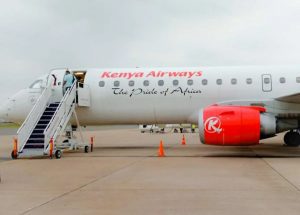Partnerships have been gathering momentum as Africa’s aviation sector navigates its post-pandemic recovery and the issue of high fuel and oil prices.
AeroTime revisits the ongoing partnerships forming on the continent, and examines the changes made during the past four months.
African leaders lead the charge toward new partnerships
The partnership between Kenya Airways (KQ) and South African Airways (SAA) to establish a pan-African airline by 2023 has been a significant indicator and driver of consolidation movements across the continent.
Now, the two legacy carriers are looking to partner with a West African airline to support a multi-hub strategy to enhance connectivity across the African continent.
“The intention is to invite a West African airline at some point in the future to also join. We will have a three-hub strategy of Nairobi, Johannesburg, and the West African hub to create better opportunities and services for our customers,” said KQ Board Chairman, Michael Joseph during an investor briefing in late March 2022.
The geographical location of Royal Air Maroc (RAM) in North-West Africa, situates the airline a potential suitor as the Moroccan flag carrier is no stranger to partnerships. On April 1, 2022, RAM celebrated its 2nd year as a OneWorld Alliance member – the first African airline to join the 14-membered group. The members include American Airlines (A1G) (AAL), Alaska Airlines, British Airways, Cathay Pacific, Finnair, Qatar Airways, Japan Airlines, Qantas, Iberia, Malaysia Airlines, Royal Jordanian, S7 Airlines and SriLankan Airlines.
As part of One World Alliance RAM’s network serves over 105 destinations and 51 countries within and outside Africa.
Alongside the search for a West-African airline to join KQ and SAA’s partnership, Kenya Airways partnered with Ghana-based Africa World Airlines (AWA) on May 6, 2022, in an interline SPA agreement that aims to explore the potential of both carriers’ networks and expand flight connections between East and West Africa.
The deal will give Africa World Airlines’ passengers more travel options to destinations in Ghana and West Africa while gaining access to Kenya Airways’ extensive network in Africa.
“Our combined networks will allow our customers the convenience of seamless onward connectivity to and from the Kenya Airways network onto Africa World Airlines’ network. It is imperative that we continue to interlink Africa and allow access within Africa for our passengers,” said Adedayo Olawuyi, Head of Commercial for AWA.
AWA commenced its operations in 2012, and today operates domestic and regional flights along the coast of West Africa with a fleet of Embraer ERJ-145 aircraft.
Kenya Airways Chief Commercial and Customer Officer, Julius Thairu emphasized that partnerships and collaboration will be key in unlocking air travel in Africa.
“The future of travel will be drawn from a sustainable, interconnected, and affordable Air Transport industry in Africa through partnerships and collaboration that drive the growth of Africa’s travel industry,” said Thairu.
Consolidation: a means to mitigate unit costs?
Kenya Airways Group MD & CEO Allan Kilavuka believes that consolidation is the key to alleviating airline operating costs and accessing untapped connectivity and operational benefits across the sector.
“The future of African aviation relies on consolidation to reduce unit costs and connect the continent more,” Kilavuka said during the CAPA Airline Leader Summit, which took place in the UK on April 7, 2022.
During an AviaDev Insight podcast interview released in January 2022, South African Airways chief commercial officer, Simon Newton-Smith alluded to the fact that Africa’s airlines must reinvent their business models to operate in the industry’s current landscape.
“If you look at the global aviation landscape, the capacity versus population size, there is such a gap for Africa,” said Newton-Smith.
Newton-Smith also pointed out that, in their current form, African airlines would not be able to independently meet the increasing need of the continent’s growing middle class.
“Partnerships are absolutely key,” said Newton-Smith, who went on to describe the SAA-KQ partnership as an “opportunity” to connect networks and increase connectivity on the continent.
However, while most of the attention has revolved around the SAA-KQ partnership, other African airlines have taken a similar approach to combine forces to enhance operations and services offered to passengers, reducing their unit costs amid high global fuel prices.
In March 2022, six Nigerian airlines — Air Peace, Arik Air, Azman Air, Aero Contractors, United Nigeria, and Max Air — came together to form the ‘Spring Alliance’.
The motive behind the alliance is to put aside domestic airline rivalries and give passengers access to better service, while allowing for increased efficiency and wider operational capabilities for the airlines themselves, according to airline leaders, as reported by Nigeria’s The Guardian.
“In the aviation world, we have so many alliances that airlines key into. We have the Star Alliance; there is One World and several others. And airlines decide to key into those alliances for the benefit of both the passengers and the airlines themselves,” said Chairman of Air Peace, Allen Onyema.
The formation of the Spring Alliance is a measure to respond to the complaints of the flying public, explains Onyema.
“For example, if Air Peace has a technical issue on any of its aircraft, the passengers of Air Peace need not be delayed. If any member of this alliance is going to the same destination, all we need to do is to move the passengers over to that other airline, a member of the alliance, at no further cost to the passenger,” Onyema said.
The alliance looks set to adopt industry practices tailored to passengers’ needs, added United Nigeria Airlines chief executive officer, Dr. Obiora Okonkwo.
“There’s no doubt that Nigerian airlines are going through some situations and part of the way to react to this is to have the passengers in mind. It is simply thinking out-of-the-box. We are not reinventing the wheel, we are just adopting what we have seen that has worked in other places, and it will surely work in Nigeria so that the passengers going to the airport are more guaranteed that they will fly,” Okonkwo said.
High fuel costs
Passengers of Nigerian Airlines have voiced concerns about flight delays and cancellations. The recent hike in fuel prices has exacerbated the fuel crisis for Nigeria’s airlines, almost resulting in operations shutting down during March 2022.
The crisis was averted after Mele Kyari, Managing Director of the Nigerian National Petroleum Corporation (NNPC), announced that a “transparent basis of fuel pricing” in Nigeria would be agreed on by the Major Oil Marketers Association of Nigeria (MOMAN), Depot Petroleum Products Marketers Association (DAPPMA) and Airline Operators of Nigeria.
However, this was not the end of the jet fuel saga for Nigeria’s airlines as the Airline Operators of Nigeria (AON) announced another flight halt to take effect on May 9, 2022.
The AON emphasized that fuel costs now accounted for up to 95% of Nigerian airlines’ operating costs against an industry average of 40%.
Member airlines of the AON consisting of Max Air, Ibom Air, Aero Contractors, Overland Airways, Air Peace, United Nigeria Airlines, Arik Air, Azman Air and Dana Air, jointly signed onto the planned flight halt.
However, Ibom Air, Arik Air, Air Peace, Aero Contractors and Dana Air, pulled out of the plan according to a report from Premium Times.
The planned flight halt come under pressure from Nigerian government officials on the potential long-term effects on Nigeria’s economy. This moved the AON to agree to temporarily suspend the plan and engage in dialogue with the Nigerian Government to come to a solution.
Nigeria is Africa’s most populous country with more than 200 million people. Its growing domestic market provides a unique environment for Nigeria’s domestic carriers.
In November 2021, The News Agency of Nigeria (NAN) reported that Nigerian airports served 6,420,820 passengers in the first six months of 2021, according to a ‘Passengers Traffic Statistic Report’ provided by the Federal Airports Authority of Nigeria (FAAN).
This was a 50.5% increase against 4,267,409 passengers served between January 2020 and June 2021.
A statement released by the African Airlines Association (AFRAA) on April 11, 2022, accentuates the hurdle posed by high jet fuel prices on passenger traffic recovery in Africa.
“In Africa, the jet fuel price hike is worrying and has the potential to slow down the travel recovery,” the association commented. “Platts estimates that the total impact of the price increases on the overall jet fuel bill will reach $86.3 billion based on an estimated average price of $115 per barrel.”
AFRAA estimates the sector’s revenues will fall by $4.7 billion compared to 2019 levels. In 2021, revenue for African airlines fell by $8.6 billion compared to 2019 levels.
Source: Aerotime Hub






